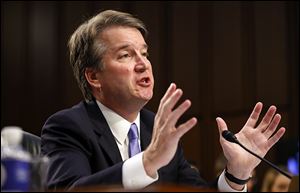
EDITORIAL
Kavanaugh fight really about how government should function
9/8/2018The Senate Judiciary Committee hearings on Brett Kavanaugh’s nomination to the Supreme Court of the United States was not, fundamentally, about access to memos Judge Kavanaugh wrote when he was an aide to then-President George W. Bush.
They were not about the judge’s view of abortion.
The hearings were not about Judge Kavanaugh’s role in the pre-impeachment of Bill Clinton. And they were not even about raw partisanship and power.
The hearings touched on all those things and played into all those things.
But the fundamental thing at issue is this nomination is something that sounds very undramatic: the separation of powers.

President Donald Trump’s Supreme Court nominee, Brett Kavanaugh, testifies before the Senate Judiciary Committee.
Judge Kavanaugh believes in the core constitutional idea of separate and distinct powers for the three branches of government. He believes that the Congress should make our laws, and that the executive should enforce them, and the judicial branch interpret them.
This means that he does not think the high court should do what it has often done, and more often than not done for some 65 years — what the Congress would not and could not do.
The Supreme Court, under Earl Warren, and several influential associate justices, pushed the nation forward on civil rights in the 1950s and early 1960s. It led when Congress and the executive did not.
The nation and the Congress caught up in the late 1960s and 1970s. But many, if not most, Americans would laud the court for going where the people’s representatives were not yet willing to go.
Lower levels of the federal courts also paved the way on civil rights and on sex discrimination and even protection of the environment.
Similarly, the Supreme Court made new law on the right to abortion, in the first trimester of pregnancy. The country had not yet come to terms with the issue, and the Congress could not reach a consensus. The court stepped in.
Most recently the court weighed in on gay marriage — making it legal, mostly on equal protection grounds, when neither the Congress nor the state legislatures of the land were remotely close to making such law.
Many if not all of these advances would be applauded by a great many of us, and one cannot help but admire the courage of the court, which is, we must also note, protected from popular opinion.
The court did what elected leaders did not have the guts to do.
The question is whether the court should act in this way — whether it should make new law and get ahead of the people and their elected leaders.
Just as one might approve what President Barack Obama did for the immigration “dreamers,” from a policy point of view, but deplore government by executive order for its fundamentally unconstitutional nature, one can agree with the court on abortion or gay marriage and still say: That is not your job. That is the job of Congress.
We either have the government the founders created, or we do not.
Judge Kavanaugh has made clear, in his jurisprudence and again in last week’s hearings, when he had a chance to speak, that he does not believe it is the role of the Supreme Court to usher in social change, or to create new law. He, like the late Justice Antonin Scalia, believes Congress alone should make our laws, when it and the people are ready for change. He believes the courts have no business pulling us into the future, even when they might know best.
Mr. Kavanaugh believes in one might call a limited judiciary. Not only does this put him at odds with much conventional legal and political wisdom today, but he will tip the Supreme Court decisively in this direction. It is a direction some will see as backward and others will see as constitutional and a correction. He would replace, after all, Anthony Kennedy, the long-time swing vote on the court and the justice who wrote the majority opinion on gay marriage.
Above and beyond the bad soap opera acting of some members of the Senate committee, there is the real and momentous issue of how this government will function. The irony is that, after all these years of court activism, no matter how many decisions may have been usurpations, the Congress and people may have become hooked on the judicial lead.